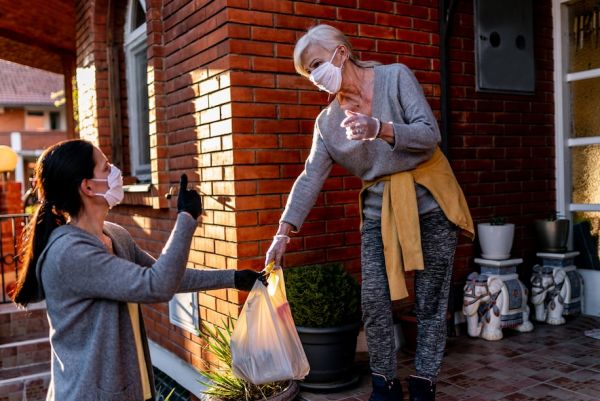Research suggests that volunteers aren’t just helping the communities they serve. People who volunteer actually experience a boost in their mental health — good news at a time when more than a third of Americans report feeling symptoms of anxiety or depression.
In a study published this year in the Journal of Happiness Studies, researchers examined data from nearly 70,000 subjects in the United Kingdom. Participants answered survey questions about their volunteering habits and mental health, including their distress and functioning in everyday life. They did this every two years from 1996 to 2014.
Compared to people who didn’t volunteer, people who had volunteered in the past year were more satisfied with their lives and rated their overall health as better. Additionally, the researchers found that people who volunteered more frequently experienced greater benefits: Those who volunteered at least once a month reported better mental health than participants who volunteered infrequently or not at all.
But does volunteering make people happy, or are happy people simply more likely to volunteer? The researchers found the same results even when they accounted for participants’ initial levels of well-being before they started volunteering. In other words, people who started to volunteer became happier over time.
While it’s true that people who are happier do tend to spend more time volunteering, the current study suggests that you don’t need to already feel happy to benefit from it. In fact, some research suggests that people who start out with lower levels of well-being may even get a bigger boost from volunteering.
To get a sense of how large the benefits of volunteering were, the researchers compared it to the effects of income. They found that, for a participant earning an average middle-class salary, volunteering was essentially “worth” approximately $1,100 per year. That is, volunteering would make someone as happy as having an extra $1,100.
Why does volunteering support mental health? According to Ricky Lawton, associate director at Simetrica Research Consultancy and lead author of the paper, a combination of factors is likely at play. First, volunteering appears to be intrinsically rewarding — when we help others, we tend to experience what researchers call a “warm glow.” Second, volunteering is likely to help boost a sense of social connection. In particular, for older adults, volunteering can be a way to stay connected to others after retirement.
Finally, volunteering can be a way to build professional skills and try out leadership opportunities, which is especially relevant to young adults. In the current study, the researchers found that participants ages 16 to 24 and 55 to 74 were especially likely to benefit from volunteering, perhaps because of the opportunity to build social connections and new skills.
Stories abound during covid time of volunteers making food for others, as well as delivering medicine and other necessities. Homeowners and companies are opening their doors to give health-care workers free temporary places to stay while they isolate from their families. Armies of people with sewing machines are making and sending masks across the country at no cost. Even the inventor of the N95 mask is volunteering his time.
And many nonprofit organizations are offering opportunities to volunteer remotely from home during the pandemic. You can tutor students over Zoom, have your dog listen while a youngster reads a book online or play a free concert for others to enjoy. Google “virtual volunteer opportunities” for many more options.
While research hasn’t directly compared virtual volunteering to the traditional in-person kind, Lawton suspects that remote volunteer opportunities are likely to also benefit well-being. So, if you’ve been feeling overwhelmed or out of sorts lately (so many of us have), volunteering can be a way to help bring you a sense of control in a stressful situation — a happy side effect of lending a hand to someone in need.



